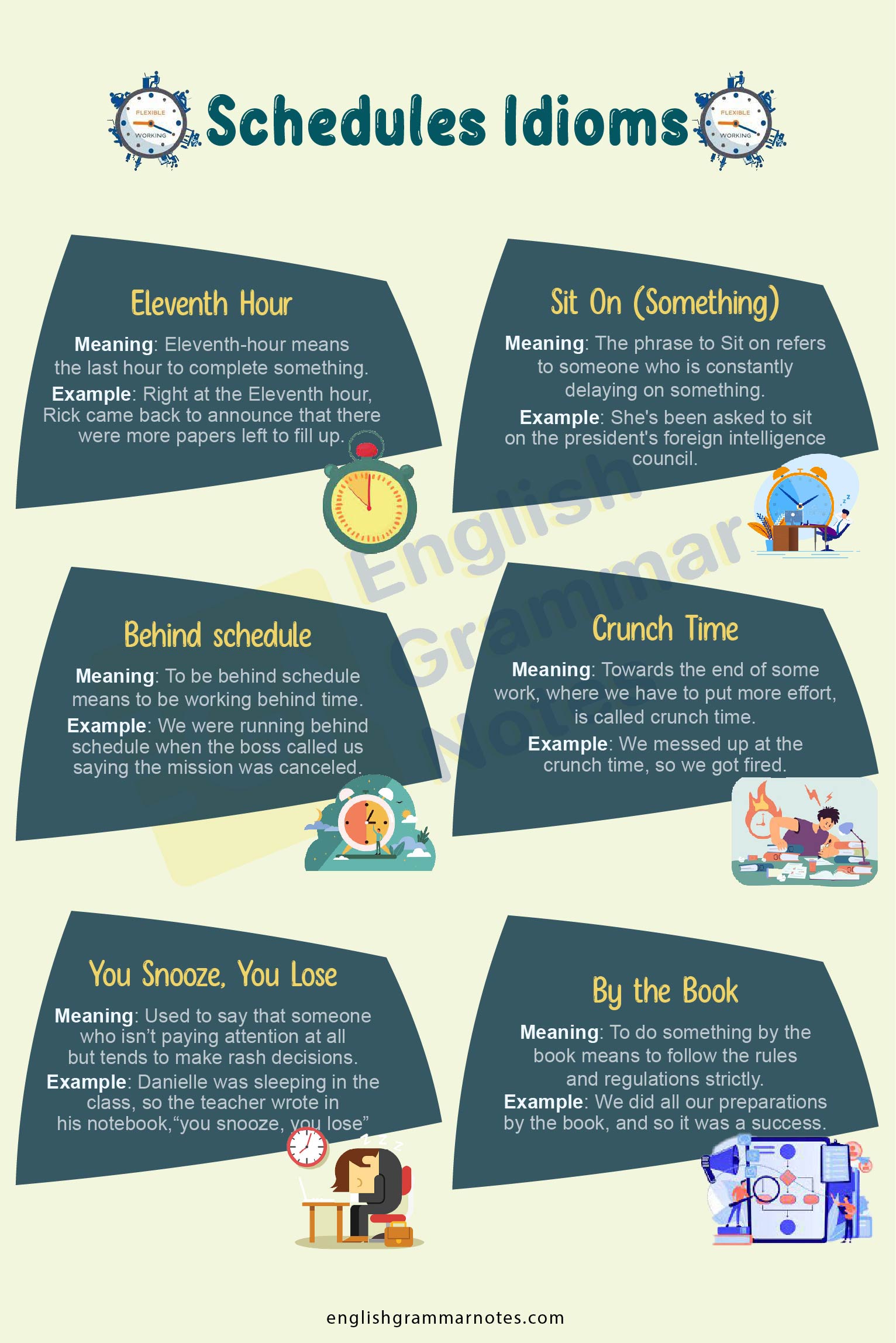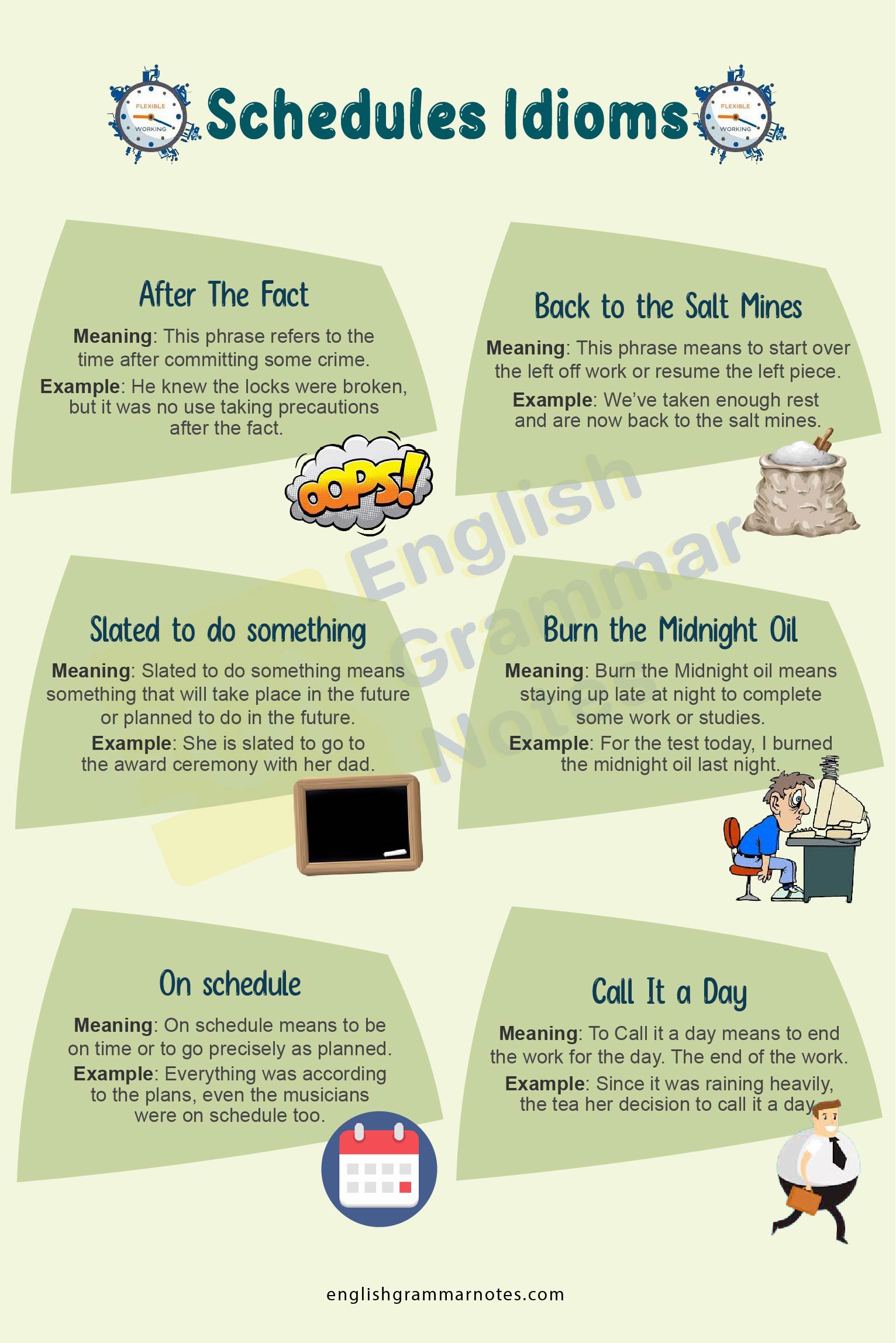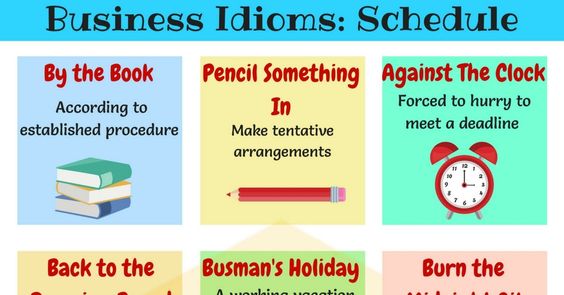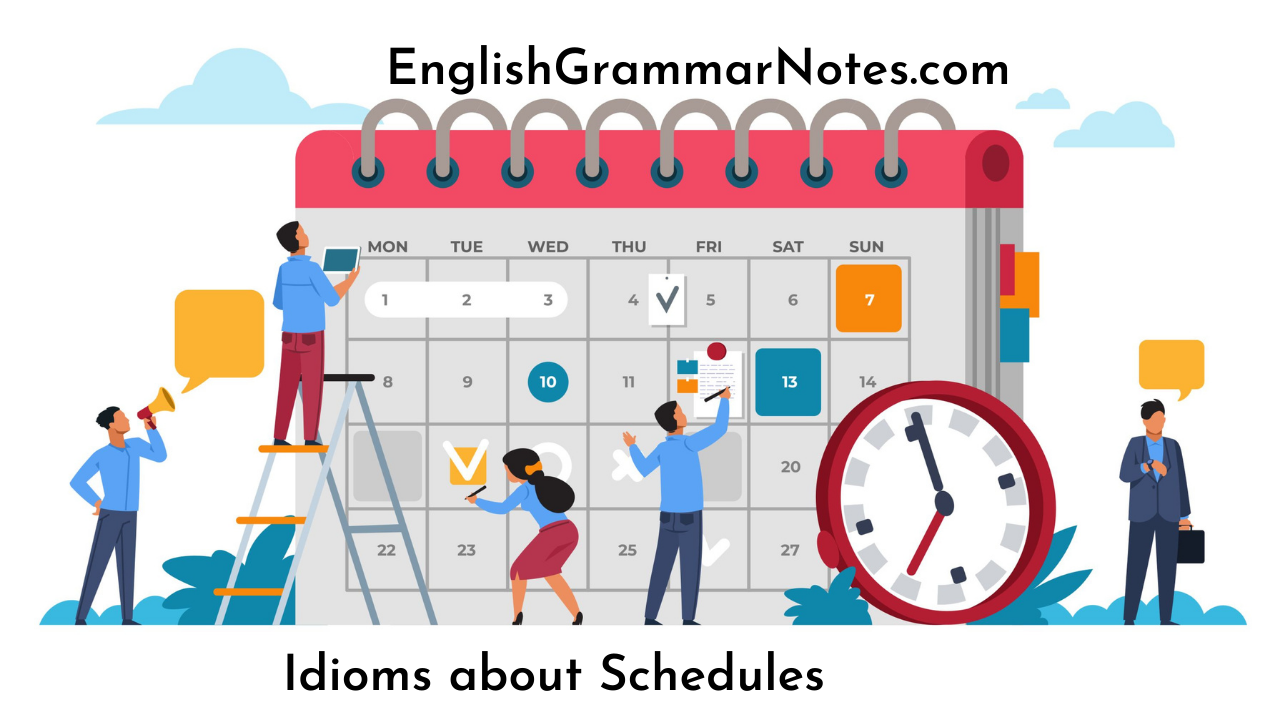Idioms about Schedules: Idioms, as we know, are an essential part of our everyday speech. They are the rhetorical way of express our daily sentences.
Idioms have a wide variety to them. There are all different types of idioms ranging from idioms about planning to idioms about problems and idioms about complexity. Idioms help us to express ourselves more creatively. The use of idioms in our everyday lives is scheduled with a rhetorical twist.
Enrich your Vocabulary by practicing the English Idioms that are commonly used in everyday conversations and understand their actual meaning.
Name of Idioms about Schedules
List of Idioms about Schedules
- On schedule
- Slated to do something
- (Do Something) By the Book
- (In the) Fullness of Time
- After The Fact
- Against The Clock
- Back to the Drawing Board
- Back to the Salt Mines
- Burn the Candle at Both Ends
- Burn the Midnight Oil
- Business as Usual
- Call It a Day
- Crunch Time
- Eleventh Hour
- Kick the Can Down the Road
- Sit On (Something)
- Sneak Peek
- Thank God It’s Friday
- You Snooze, You Lose
- Behind schedule
- Ahead of schedule
Meaning and Examples of some commonly used Idioms about Schedules
On schedule
Meaning: On schedule means to be on time or to go precisely as planned.
Example: Everything was according to the plans, even the musicians were on schedule too.
Slated to do something
Meaning: Slated to do something means something that will take place in the future or planned to do in the future.
Example: She is slated to go to the award ceremony with her dad.
(Do Something) By the Book
Meaning: To do something by the book means to follow the rules and regulations strictly.
Example: We did all our preparations by the book, and so it was a success.

(In the) Fullness of Time
Meaning: The phrase in the fullness of time is used to say that something will happen gradually.
Example: Our plans don’t always go in vain; they are capable of coming true in the fullness of time.
After The Fact
Meaning: This phrase refers to the time after committing some crime.
Example: He knew the locks were broken, but it was no use taking precautions after the fact.
Against The Clock
Meaning: This phrase is used to say to do something as quickly as possible and finish it before the last minute.
Example: Only an hour was left for the doors to close, so we had to race against the clock to get an entry.
Back to the Drawing Board
Meaning: The idiom to go back to the drawing board means to start it all over again.
Example: We had missed all the basics, so we had to go back to the drawing board to polish our skills.
Back to the Salt Mines
Meaning: This phrase means to start over the left off work or resume the left piece.
Example: We’ve taken enough rest and are now back to the salt mines.
Burn the Candle at Both Ends
Meaning: The idiom to burn the candle at both ends means to take up work that is very difficult to complete within a short period or to take up more work than one can finish.
Example: We already had twenty files to complete and to take up thirty more was like to burn the candle at both ends.
Burn the Midnight Oil
Meaning: Burn the Midnight oil means staying up late at night to complete some work or studies.
Example: For the test today, I burned the midnight oil last night.
Business as Usual
Meaning: This phrase refers to the non-stop ongoing work which isn’t stopping even with different difficulties.
Example: Business as usual was packed up, but we still managed to find out time for our friends and families.
Call It a Day
Meaning: To Call it a day means to end the work for the day. The end of the work.
Example: Since it was raining heavily, the tea her decision to call it a day.

Crunch Time
Meaning: Crunch time is often referred to as the most critical time of the work. Towards the end of some work, where we have to put more effort, is called crunch time.
Example: We messed up at the crunch time, so we got fired.
Eleventh Hour
Meaning: Eleventh-hour means the last hour to complete something.
Example: Right at the Eleventh hour, Rick came back to announce that there were more papers left to fill up.
Kick the Can Down the Road
Meaning: The idiom to kick the can down the road means to put off some work or to avoid work.
Example: He might be a senior officer, but sooner or later, he will have to stop kicking the can down the road and get serious.
Sit On (Something)
Meaning: The phrase to Sit on refers to someone who is constantly delaying on something.
Example: He had been sitting on the projects for a month now; it’s ridiculous that he is not getting fired.
Sneak Peek
Meaning: Sneak peek among the most famous idioms used to express to take a quick look at something, without anyone knowing about it.
Example: We thought it would be better to take a sneak peek at the papers before writing them down, but to our bad luck, the report wasn’t there.
Thank God It’s Friday
Meaning: This idiom is utilized to say that finally, the whole week of working days is over, and now it’s going to be the weekend.
Example: Every day when waking up, I always thrive on saying, “thank god it’s Friday.”
You Snooze, You Lose
Meaning: This is an informal idiom used to say that someone who isn’t paying attention at all but tends to make rash decisions.
Example: Danielle was sleeping in the class, so the teacher wrote in his notebook, “you snooze, you lose”
Behind schedule
Meaning: To be behind schedule means to be working behind time. That is when you cannot finish the work in time.
Example: We were running behind schedule when the boss called us saying the mission was canceled.
Ahead of schedule
Meaning: This phrase means to complete the work much faster than it was predicted. To finish the work ahead of time.
Example: We went to the party since we finished our work way ahead of time.

